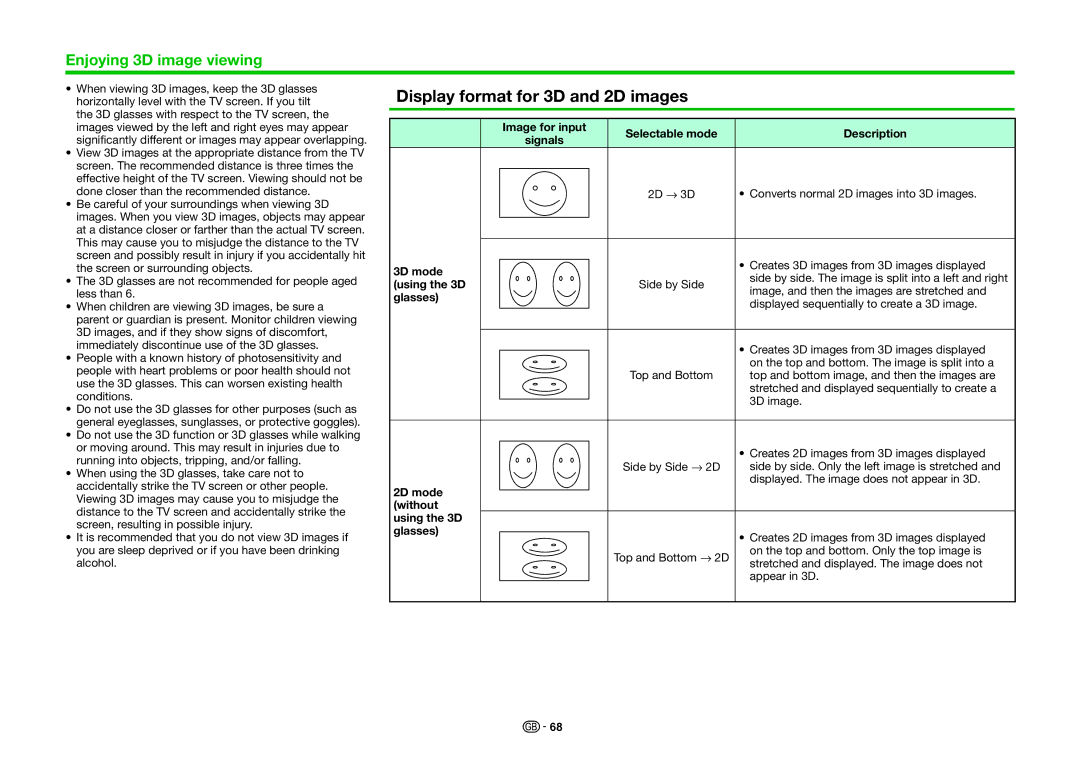
Enjoying 3D image viewing
•When viewing 3D images, keep the 3D glasses horizontally level with the TV screen. If you tilt the 3D glasses with respect to the TV screen, the images viewed by the left and right eyes may appear significantly different or images may appear overlapping.
•View 3D images at the appropriate distance from the TV screen. The recommended distance is three times the effective height of the TV screen. Viewing should not be done closer than the recommended distance.
•Be careful of your surroundings when viewing 3D images. When you view 3D images, objects may appear at a distance closer or farther than the actual TV screen. This may cause you to misjudge the distance to the TV screen and possibly result in injury if you accidentally hit the screen or surrounding objects.
•The 3D glasses are not recommended for people aged less than 6.
•When children are viewing 3D images, be sure a parent or guardian is present. Monitor children viewing 3D images, and if they show signs of discomfort, immediately discontinue use of the 3D glasses.
•People with a known history of photosensitivity and people with heart problems or poor health should not use the 3D glasses. This can worsen existing health conditions.
•Do not use the 3D glasses for other purposes (such as general eyeglasses, sunglasses, or protective goggles).
•Do not use the 3D function or 3D glasses while walking or moving around. This may result in injuries due to running into objects, tripping, and/or falling.
•When using the 3D glasses, take care not to accidentally strike the TV screen or other people. Viewing 3D images may cause you to misjudge the distance to the TV screen and accidentally strike the screen, resulting in possible injury.
•It is recommended that you do not view 3D images if you are sleep deprived or if you have been drinking alcohol.
Display format for 3D and 2D images
| Image for input | Selectable mode | Description |
| signals | ||
|
|
| |
|
| 2D s3D | • Converts normal 2D images into 3D images. |
|
| ||
|
|
|
|
3D mode |
|
|
| • Creates 3D images from 3D images displayed |
|
|
| side by side. The image is split into a left and right | |
(using the 3D |
|
| Side by Side | |
|
| image, and then the images are stretched and | ||
glasses) |
|
|
| |
|
|
| displayed sequentially to create a 3D image. | |
|
|
|
| |
|
|
|
|
|
|
|
|
| • Creates 3D images from 3D images displayed |
|
|
|
| |
|
|
|
| on the top and bottom. The image is split into a |
|
|
| Top and Bottom | top and bottom image, and then the images are |
|
|
|
| stretched and displayed sequentially to create a |
|
|
|
| 3D image. |
|
|
|
| |
|
|
|
|
|
|
|
|
| • Creates 2D images from 3D images displayed |
|
|
|
| |
|
|
| Side by Side s2D | side by side. Only the left image is stretched and |
2D mode |
|
|
| displayed. The image does not appear in 3D. |
|
|
|
| |
|
|
|
| |
(without |
|
|
|
|
using the 3D |
|
|
|
|
glasses) |
|
|
| • Creates 2D images from 3D images displayed |
|
|
| ||
|
|
|
| |
|
|
| Top and Bottom s2D | on the top and bottom. Only the top image is |
|
|
| stretched and displayed. The image does not | |
|
|
|
| appear in 3D. |
![]()
![]() 68
68
